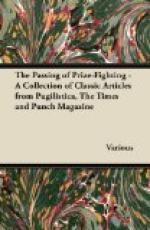Was there ever anything so lucky that the strike of the masons should have happened at this identical juncture! Parliament is prorogued. Now, deducting Sir Robert Peel, physician, with his train of apothecaries and pestle-and-mortar apprentices, who, until February next, are to sit cross-legged and try to think, there are at least six hundred and thirty unemployed members of the House of Commons, turned upon the world with nothing, poor fellows! but grouse before them. Some, to be sure, may pick their teeth, in the Gardens of the Tuileries—some may even now venture to exercise their favourite elbow at Baden-Baden,—but with every possible and probable exception, there will yet be hundreds of unemployed law-makers, to whom time will be a heavy porter’s burden.
We have a plan which, for its originality, should draw down upon us the gratitude of the nation. It is no other than this: to make all Members of Parliament, for once in their lives at least, useful. The masons, hired to build the new temples of Parliament, have struck. The hard-handed ingrates,—let them go! We propose that, during the prorogation at least, Members of Parliament, should, like beavers, build their own Houses. In a word, every member elected to a seat in Parliament should be compelled, like Robinson Crusoe, to make his own furniture before he could sit down upon it.
Have we not a hundred examples of the peculiar fitness of the task, in the habits of what in our human arrogance we call the lower animals? There is many a respectable spider who would justly feel himself calumniated by any comparison between him and any one of twenty Parliamentary lawyers we could name; yet the spider spins its own web, and seeks its own nook of refuge from the Reform Broom of Molly the housemaid. And then, the tiny insect, the ant—that living, silent monitor to unregarding men—doth it not make its own galleries, build with toilsome art its own abiding place? Does not the mole scratch its own chamber—the carrion kite build its own nest! Shall cuckoos and Members of Parliament alone be lodged at others’ pains?
Consider the wasp, oh, STANLEY! mark its nest of paper.—(it is said, on wasp’s paper you are wont to write your thoughts on Ireland)—and resolutely seize a trowel!
Look to the bee, oh, COLONEL SIBTHORP! See how it elaborates its virgin wax, how it shapes its luscious cone—and though we would not trust you to place a brick upon a brick, nevertheless you may, under instruction, mix the mortar!
Ponder on the rat and its doings, most wise BURDETT—see how craftily it makes its hole—and though you are too age-stricken to carry a hod, you may at least do this much—sift the lime.
But wherefore thus particular—why should we dwell on individuals? Pole-cat, weasel, ferret, hedgehog, with all your vermin affinities, come forth, and staring reproachfully in the faces of all prorogued Members, bid them imitate your zeal and pains, and—the masons having struck—build their Houses for themselves.




